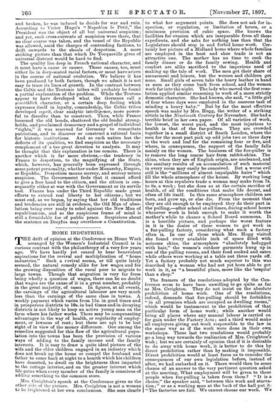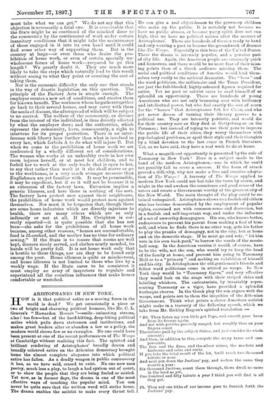HOME INDUSTRIES. T HE drift of opinion at the Conference on
Home Work arranged by the Women's Industrial Council is in curious contrast with the philanthropy of a very few years ago. We have hardly yet ceased to hear benevolent aspirations for the revival and multiplication of "home industries." Such a revival seems, or till quite lately seemed, the natural remedy alike for low wages and for the growing disposition of the rural poor to migrate to large towns. Though that migration is very far from being wholly a question of wages, there can be no doubt that wages are the cause of it in a great number, probably in the great majority, of cases. In figures, at all events, the earnings of the agricultural labourer are very much less than the earnings of the same class in towns. A weekly payment which varies from 15s. in good times and. in prosperous districts to 10s. in bad times and in decaying districts is not likely to keep an active young man on the farm where his father works. There may be compensating advantages in the way of health, or regularity of employ- ment, or lowness of rent; but these are apt to be lost sight of in view of the money difference. One among the remedies suggested for this flow of the agricultural popu- lation into the towns has been the provision of various ways of adding to the family income and the family interests. It is easy to draw a quite ideal picture of the wife and the elder children engaged in an industry which does not break up the home or compel the husband and father to come back at night to a hearth which his children have deserted, to dwell on the brightness thus imparted to the cottage interior, and on the greater interest which life gains when every member of the family is conscious of adding something to the common store.
Mrs..Creighton's speech at the Conference gives us the other side of the picture. Mrs. Creighton is not a woman to be frightened at her own conclusions. She sees clearly to what her argument points. She does not ask for in- spection, or regulation, or limitation of hours, or a minimum provision of cubic space. She knows the facilities for evasion which are inseparable from all these expedients, and she asks for nothing less than that the Legislature should stop in and forbid home work. Cer- tainly her picture of a Midland home where whole families are employed in the boot and shoe trade is not an attractive one. The mother has no time to cook the family dinner or do the family sewing. Health and comfort are alike sacrificed to the imperious need of making up the tale of work. The men get their share of amusement and leisure, but the women and children get none. Small girls of seven take the heavy leather in hand as soon as they come back from school, and the women work far into the night. The lady who moved the first reso- lution applied similar reasoning to work of a more strictly domestic character. She had known, she said, "a little girl of four whose days were employed in the onerous task of minding a heavy baby." But by far the most effective speech was make by Mrs. Hogg, the writer of a striking article in the Nineteenth Century for November. She had a terrible brief in her own paper. Of all varieties of work, the lowest, the worst paid, and the most injurious to health is that of the fur-pullers. They are crowded together in a small district of South London, where the men for the most part pick up odd jobs two or three days in the week and loaf for the remaining four or five, and where, in consequence, the support of the family falls mainly on the women. The business of the fur-puller is to remove the long coarse hair from rabbit-skins. The skins, when they are of English origin, are uncleaned, and the sanitary results of an accumulation of such material in every room may easily be conceived. But a worse evil still is the "millions of almost impalpable hairs" which fill the whole atmosphere of the house. By working long hours at this repulsive trade a woman may make from 7s. to 8s. a week ; but she does so at the certain sacrifice of health, of all the conditions that make life decent, and often of life itself. In this same atmosphere children are born, and grow up, or else die. From the moment that they are old enough to be employed they do their part in the pulling,—after school at all times, during school hours whenever work is brisk enough to make it worth the mother's while to chance a School Board summons. It is a horrible picture, and perhaps the worst feature in it is the desire of these women to get work in a fur-pulling factory, considering what such a factory often is. In one of those which Mrs. Hogg visited she found every available inch of space filled with noisome skins, the atmosphere "absolutely befogged with hair," the women's outdoor garments hung up in one of the pulling rooms, and their food cooked and eaten while others were working at a table not three yards off. Yet a factory probably not much superior to this was described by a woman who had not yet been able to get work in it, as "a beautiful place, more like the 'orapital than a shop."
The framers of the resolutions adopted by the Con- ference seem to have been unwilling to go quite as far as Mrs. Creighton. They do not insist on the absolute prohibition of home work. One of the resolutions, indeed, demands that fur-pulling should be forbidden "in all premises which are occupied as dwelling rooms," which would be tantamount to the prohibition of that particular form of home work; while another would bring all places where any manual labour is carried on for gain under the Factory Acts ; and a third would make all employers giving out work responsible to the law in the same way as if the work were done in their own workshops. These last two resolutions would probably go a long way towards the realisation of Mrs. Creighton's wish ; but we are certainly of opinion that if it is desirable to do away with home work, it is better to do this by direct prohibition rather than by making it impossible. Direct prohibition would at least force us to consider the consequences of our own legislation before, instead of after, we had embarked on it. There would then be some chance of an answer to the very pertinent question asked at the meeting, What employment will be given to these people when fur-pulling is taken from them ? "It is a choice," the speaker said, "between this work and starva- tion;" or as a working man at the back of the hall put it: "The factories are full. We cannot choose our work. We must take what we can get." We do not say that this objection is necessarily a fatal one. It is conceivable that the State might be so convinced of the mischief done to the community by the continuance of work under certain insanitary conditions that it might take the maintenance of those engaged in it into its own hand until it could find some other way of supporting them. But is the country at large—or even those who desire the pro- hibition of home work, or even of certain specially un- wholesome forms of home work—prepared to go this length ? We greatly doubt it. They are much more likely to take the steps which naturally lead to this result without seeing to what they point or counting the cost of taking them.
Nor is the economic difficulty the only one that stands in the way of drastic legislation on this question. The principle of the Factory Acts is simple enough. The employer creates a new set of conditions, and creates them for his own benefit. The workmen whom he gathers together go back to their several homes, and may carry with them the seeds of disease, the afterspread of which will be subject to no control. The welfare of the community, as distinct from the interest of the individual, is thus directly affected by what the employer does ; and the authorities, which represent the community, have, consequently, a right to intervene for its proper protection. There is no inter- ference with liberty here further than what is involved in every law, which forbids A to do what will injure B. But when we come to the prohibition of home work we are confronted by a wholly different set of considerations. The woman who works at an unhealthy trade in her own room injures herself, or at most her children, and to forbid her to work at the only trade that is open to her, to say that rather than work at it she shall starve or go to the workhouse, is a very much stronger measure than Englishmen are yet familiar with. It may be permissible, it may be expedient, but if so it will not be because it is an extension of the factory laws. Extension implies a generic likeness, and here there is nothing of the sort. The factory laws protect men against their neighbours, the prohibition of home work would protect men against themselves. Nor must it be forgotten that, though there are some home industries which are directly injurious to health, there are many others which are so only indirectly or not at all. If Mrs. Creighton is cor- rectly reported—it is quite possible that she has not been—she asks for the prohibition of all home work because, among other reasons, "homes are uncomfortable, food is ill-cooked, and the mother has no time for ordinary sewing." If the State is to insure that rooms are well kept, dinners nicely served, and clothes neatly mended, its hands will be pretty full. It is not home work only that is hostile to these things, nor are they to be found only among the poor. Home idleness is quite as mischievous, and home idleness is not limited to those who live by a. weekly wage. If the State cares to be consistent it must employ an army of inspectors to regulate and superintend all the countless influences that make homes comfortable or wretched.







































 Previous page
Previous page